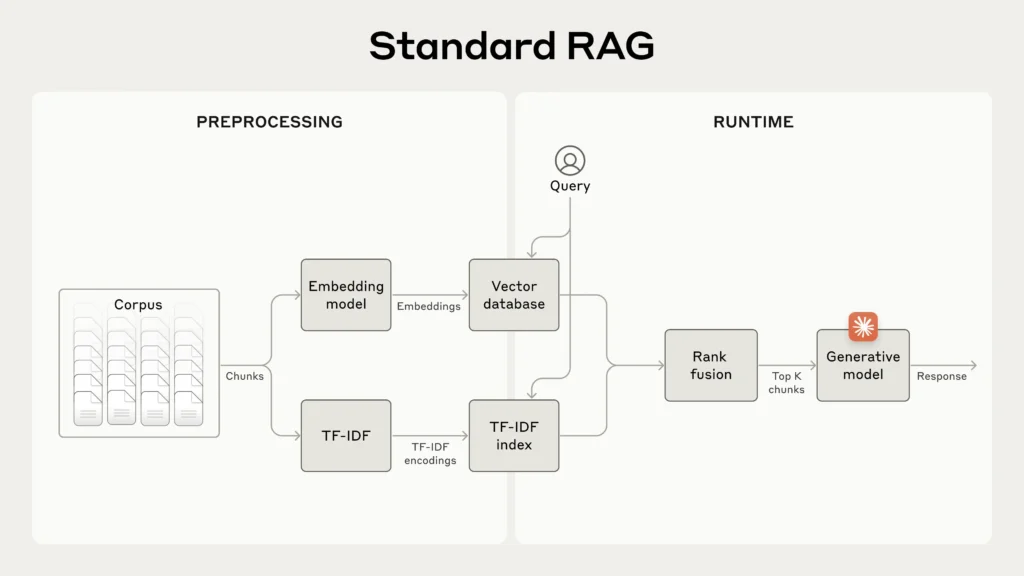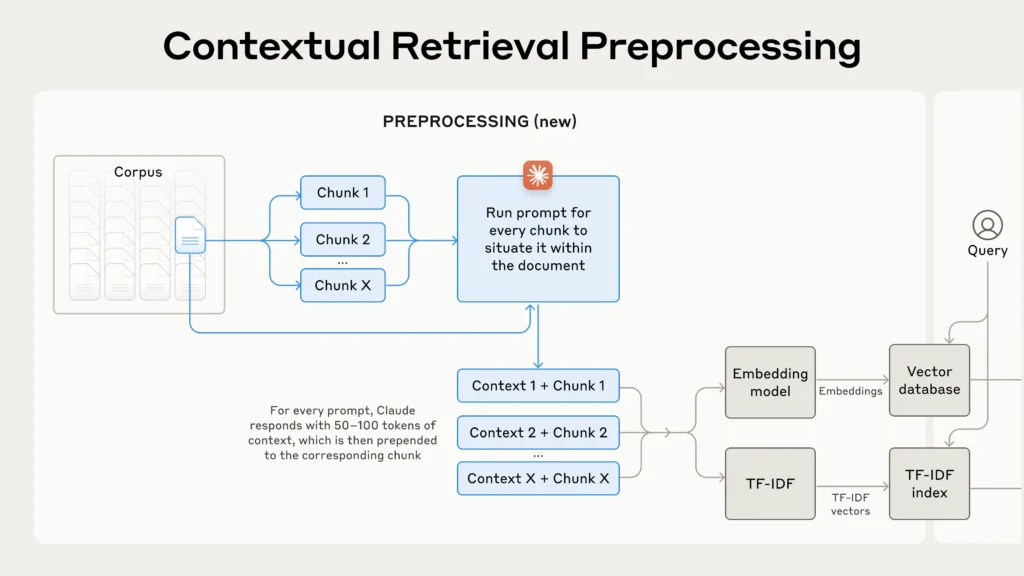The world of AI is buzzing with excitement about Retrieval-Augmented Generation (RAG) – a powerful technique that combines the best of both worlds: large language models (LLMs) and external knowledge bases. RAG empowers LLMs to access and leverage information from external sources, making them more accurate, informative, and reliable.
But while RAG is a game-changer, the challenge lies in finding the right retrieval method. Enter Anthropic, a leading AI research company, with their groundbreaking contextual retrieval technique. This blog post dives deep into Anthropic’s approach, exploring its key features, benefits, and potential impact on the future of AI.

Table of Contents
ToggleThe Need for Contextual Retrieval
Traditional RAG methods often rely on keyword-based retrieval, which can lead to inaccurate or irrelevant results. This is because keywords can be ambiguous and may not capture the nuances of a query.
Anthropic’s contextual retrieval addresses this limitation by going beyond simple keywords. It leverages the power of LLMs to understand the context of a query and retrieve relevant information from a vast knowledge base. This approach ensures that the retrieved information is not only relevant but also aligned with the user’s intent.

How Anthropic’s Contextual Retrieval Works
Imagine you’re asking an LLM a question like, “What is the capital of France?” A traditional RAG system might simply search for the keyword “France” and retrieve any document containing that word. This could lead to irrelevant results like articles about French cuisine or French history.
Anthropic’s contextual retrieval, on the other hand, takes a more nuanced approach. It analyzes the entire query, understanding that you’re asking about a specific geographical entity. It then uses this contextual information to search for relevant documents, ensuring that the retrieved information is directly related to the capital of France.

Key Features of Anthropic’s Contextual Retrieval
Contextual Embeddings
Anthropic’s system uses contextual embeddings to represent both the query and the documents in a high-dimensional space. This allows it to measure the semantic similarity between the query and each document, ensuring that the retrieved information is closely related to the user’s intent.
Efficient Retrieval
The system employs efficient retrieval techniques that allow it to search through vast knowledge bases quickly and accurately. This is crucial for real-time applications where speed is paramount.
Fine-tuning for Specific Tasks
Anthropic’s contextual retrieval can be fine-tuned for specific tasks, such as question answering, summarization, or translation. This allows the system to be tailored to specific domains and applications.
Benefits of Anthropic’s Contextual Retrieval
- Improved Accuracy: By understanding the context of a query, Anthropic’s system can retrieve more accurate and relevant information, leading to more reliable and trustworthy responses.
- Enhanced Informativeness: The retrieved information is directly related to the user’s intent, resulting in more informative and comprehensive answers.
- Increased Efficiency: Efficient retrieval techniques ensure that the system can process queries quickly, providing users with timely and relevant information.
- Broader Applicability: The system can be applied to a wide range of tasks, making it a versatile tool for various AI applications.
The Future of RAG with Anthropic’s Contextual Retrieval
Anthropic’s contextual retrieval represents a significant advancement in the field of RAG. It paves the way for more powerful and intelligent AI systems that can access and leverage information from the real world.
Here are some potential applications:
- Personalized Education: AI tutors can use contextual retrieval to provide students with personalized learning materials tailored to their specific needs and learning styles.
- Enhanced Customer Service: Chatbots can leverage contextual retrieval to understand customer queries better and provide accurate and helpful responses.
- Scientific Discovery: Researchers can use contextual retrieval to access and analyze vast amounts of scientific data, accelerating the pace of discovery.

Conclusion
Anthropic’s contextual retrieval is a game-changer in the world of RAG. By understanding the context of a query and retrieving relevant information, it empowers LLMs to become more accurate, informative, and reliable. This breakthrough has the potential to revolutionize how we interact with AI and unlock new possibilities for innovation and progress. As AI continues to evolve, Anthropic’s contextual retrieval will undoubtedly play a pivotal role in shaping the future of this exciting field.
FAQs (Frequently Asked Questions)
Retrieval-Augmented Generation (RAG) is an AI technique that combines large language models (LLMs) with external knowledge bases. This allows the LLMs to access external information in real-time, enhancing their accuracy, informativeness, and reliability.
Unlike traditional RAG systems, which often rely on keyword-based retrieval, Anthropic’s contextual retrieval focuses on understanding the context of the query. It uses LLMs to grasp the intent behind the query, ensuring more relevant and accurate results.
The key features include:
– Contextual Embeddings: Uses high-dimensional embeddings to measure semantic similarity between queries and documents.
– Efficient Retrieval: Ensures fast and accurate searches through large knowledge bases.
– Task-Specific Fine-Tuning: Allows for customization for specific tasks like question answering or summarization.
By analyzing the entire context of a query instead of just focusing on keywords, Anthropic’s system retrieves information more closely aligned with the user’s intent, improving the accuracy of the response.
Potential applications include personalized education, where AI tutors can offer customized learning resources, enhanced customer service with smarter chatbots, and scientific discovery through better access to vast research databases.
Anthropic’s system uses the power of LLMs to understand the full context of ambiguous or complex queries, ensuring that the retrieved information matches the intent behind the query, rather than just focusing on isolated keywords.
: Anthropic’s contextual retrieval is considered groundbreaking because it enhances the accuracy, efficiency, and versatility of RAG systems, enabling AI to provide more reliable, context-aware, and meaningful results across various tasks and industries.
Anthropic’s contextual retrieval will likely play a significant role in shaping the future of AI by enabling more intelligent systems capable of accessing and utilizing external knowledge effectively, which will revolutionize applications like education, customer service, and research.
